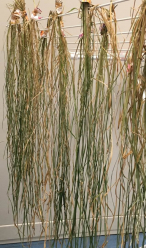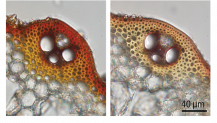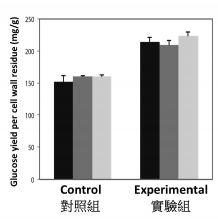Media
HKU and Kyoto U reveal a new strategy
to enhance the efficiency of cereal straw for biofuel production
04 May 2017
Straw is commonly used for feeding animals, burning, baling, etc. As one of the “Three Canton Treasures”, straw can actually be used as a raw material to produce biofuel.
Ethanol, an alcohol, is a clean and renewable biofuel traditionally produced by fermentation of sucrose from sugarcane or glucose released from corn starch. With an increasing demand on biofuel in recent years, cellulose from non-edible plant materials (e.g. sugarcane leaves, corn stalks, rice straw) has been used as raw materials for bioethanol production (Figure 1). However, since cellulose is crosslinked with lignin in plant cell walls, it is very difficult to release glucose from cellulose.
Figure 1
Cellulose in rice straw can be used for bioethanol production. However, the presence of lignin impedes the release of fermentable sugar from cellulose.
A collaborative research effort by the University of Hong Kong (HKU) and Kyoto University (Kyoto U) has revealed a new strategy to allow cellulose in rice straw to release its fermentable sugar more efficiently. The research breakthrough was recently published in a notable plant science journal Plant Physiology.
Lignin is a complex polymer which functions to provide mechanical strength and structural integrity in plants. However, expensive and complicated procedures are required to loosen the lignin barrier in order to utilize cellulose more efficiently during the production of bioethanol.
Rice and other cereals belong to the grass family (Poaceae). Lignin in their stems and leaves contain a special component called tricin. HKU plant biochemists Dr Clive Lo Sze-chung and his student Dr Lydia Lam Pui-ying, together with Kyoto U lignin specialist Dr Yuki Tobimatsu, started a collaborative project two years ago. According to their discovery, when flavone synthase II (FNSII), a key enzyme involved in tricin synthesis, is knocked out, not only is tricin not produced, but the lignin content in rice straw was also reduced by approximately one-third (Figures 2-3). In addition, the yield of glucose from cellulose degradation was increased by 37% without any chemical treatment (Figure 4). Glucose released from cellulose can be used for bioethanol production. In other words, it is more efficient to produce ethanol from this kind of rice straw: the cost of lignin treatment can be reduced and the production of ethanol can be enhanced.
Figure 2
Control (Left) and Experimental (Right). After flavone synthase II (FNII) is knocked out, rice straw does not produce tricin and its lignin content is reduced by approximately one-third. The glucose yield is increased by 37% after cellulose degradation.
Figure 3
Control (Left) and Experimental (Right). The images show the cross sections of rice stems. After knocking out FNSII (Experimental), lignin content (stained region) is substantially reduced compared to control.
Figure 4
Glucose yield from FNSII-knockout rice straw (Experimental) after cellulose degradation is increased by 37%, making it more efficient for ethanol production. Data were collected from three plants in each of the control and experimental groups.
“This is the first demonstration of the reduction of cell wall lignin content in rice straw by the disruption of tricin production”, said Clive Lo, “Importantly, there are no negative impacts on rice growth and productivity.” As plants in the grass family all contain tricin-bound lignin, this strategy can be applied to other cereals like maize, wheat, and barley as well as grass species (e.g. sorghum and switchgrass) cultivated around the world exclusively for ethanol production, so that they can be utilized more efficiently as raw materials for biofuel.
Dr. Lydia Lam has been recently awarded the JSPS Postdoctoral Fellowship for Research in Japan by the Japan Society for the Promotion of Science and will start her postdoctoral research at Kyoto U this September. She said, “I feel very delighted and honored to conduct a research project that could benefit society. Also, as a Hongkonger, I am always trained to work quickly and efficiently. During the eight-month research experience at Kyoto U, I was particularly impressed by the students there. They performed experiments with extreme care and precision. When I am doing research today, I always ask myself to do better than perfect in addition to seeking speed and efficiency.”
Link of the article in Plant Physiology :
“Disrupting Flavone Synthase II Alters Lignin and Improves Biomass Digestibility”
http://www.plantphysiol.org/content/early/2017/04/06/pp.16.01973.full.pdf+html
For the video clip about this research (with subtitles and name cards), please click here.
About the research team:
Dr Clive Lo is an Associate Professor in the School of Biological Sciences, the University of Hong Kong. His laboratory has been elucidating biosynthesis pathways of flavonoids in cereal crops for applications in metabolic engineering. His research projects are supported by the Research Grants Council of Hong Kong.
Dr Lydia Lam joined the Summer Science Institute during her secondary school years and was then inspired and determined to study Biotechnology. She was admitted to HKU in 2008 and received her Bachelor of Science (First Class Honours) Degree in Biotechnology. Afterwards, she was awarded the highly competitive Hong Kong PhD Fellowship and completed her PhD study in December 2016. Previously Lo, Lam, and other lab members published two papers in Plant Physiology on tricin biosynthesis pathway in rice, providing important theoretical basis for the above investigation.
Dr Yuki Tobimatsu is an Associate Professor in the Laboratory of Metabolic Science of Forest Plants & Microorganisms, Research Institute for Sustainable Humanosphere, Kyoto University, Japan. His research areas include structure and formation of plant cell walls, lignin chemistry and biochemistry, and molecular breeding of biofuel crops.
Media enquiry:
Dr Clive Lo, School of Biological Sciences (tel: 2299 0337; email: clivelo@hku.hk);
Ms Rhea Leung, Communication and Public Affairs Office (tel: 2857 8555/ 9022 7446; email: rhea.leung@hku.hk);
Ms Cindy Chan, Faculty of Science (tel: 3917 5286/ 6703 0212; email: cindycst@hku.hk).




